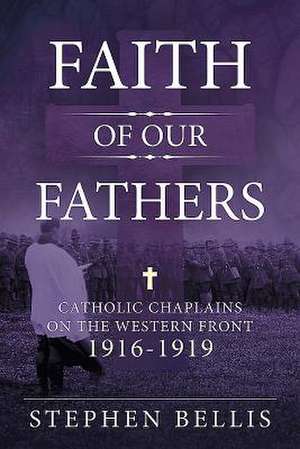Faith of Our Fathers
Autor Stephen Bellisen Limba Engleză Hardback – 21 aug 2018
Preț: 239.77 lei
Nou
Puncte Express: 360
Preț estimativ în valută:
45.88€ • 47.63$ • 38.26£
45.88€ • 47.63$ • 38.26£
Carte disponibilă
Livrare economică 01-15 martie
Livrare express 15-21 februarie pentru 39.15 lei
Preluare comenzi: 021 569.72.76
Specificații
ISBN-13: 9781912390915
ISBN-10: 1912390914
Pagini: 224
Ilustrații: 71 photos, 3 maps, 13 paintings, 2 tables
Dimensiuni: 163 x 236 x 23 mm
Greutate: 0.54 kg
Editura: HELION & COMPANY
ISBN-10: 1912390914
Pagini: 224
Ilustrații: 71 photos, 3 maps, 13 paintings, 2 tables
Dimensiuni: 163 x 236 x 23 mm
Greutate: 0.54 kg
Editura: HELION & COMPANY
Notă biografică
After a successful career in the electronics industry Steve made the change into academia in 1995. A first class honours degree at The Institute of Irish Studies at the University of Liverpool was followed by a Masters. The Institute specialises in multi-disciplinary education with literature, cultural geography, politics, and history among the topics. Dissertations included ethnographic accounts of the River Barrow in IE - Ireland, and Church-State relationships with radicalism in 1930s IE - Ireland. Identity is at the heart of Steve's work, unsurprising as his four grandparents were born in Wales, IE - Ireland, Scotland, and England. He enjoys travelling and honing his interests in cultural geography, luxuries which retirement has allowed, but prefers to call this relaxation simply as 'watching the world go by'.
This broad grounding, combined with a long term fascination with the Great War and a specific curiosity with Catholic chaplains, encouraged a further study of both. The disciplines embraced were further shaped by chaplaincy conferences at Amport which fired the imagination and led to the delivery of three papers, with further presentations at Galway and Liverpool universities. Two themes emerged. The first was to refresh and challenge the predictable and laboured existing accounts of Catholic chaplains. These versions were often sentimentalised and invariably concentrated on the well-known, with little new evidence, if any submitted. Chaplains in general have been ignored. The second theme also addressed the need to rebalance historiography. Chaplains of Irish extraction, who followed their missionary calling abroad, became out of sight and out of mind, forgotten men of whom many became chaplains in the Great War. These perceived injustices influenced the doctoral thesis which developed intuitively as 'Catholic Chaplains on the Western Front 1914-1919 - Lancashire's Pivotal Role', being completed in December 2015. The book is an evolution of a long interest in social and military history, with a religious and Irish flavour, underpinned by a desire to add new evidence to the overall history of the Great War and especially chaplains.
This broad grounding, combined with a long term fascination with the Great War and a specific curiosity with Catholic chaplains, encouraged a further study of both. The disciplines embraced were further shaped by chaplaincy conferences at Amport which fired the imagination and led to the delivery of three papers, with further presentations at Galway and Liverpool universities. Two themes emerged. The first was to refresh and challenge the predictable and laboured existing accounts of Catholic chaplains. These versions were often sentimentalised and invariably concentrated on the well-known, with little new evidence, if any submitted. Chaplains in general have been ignored. The second theme also addressed the need to rebalance historiography. Chaplains of Irish extraction, who followed their missionary calling abroad, became out of sight and out of mind, forgotten men of whom many became chaplains in the Great War. These perceived injustices influenced the doctoral thesis which developed intuitively as 'Catholic Chaplains on the Western Front 1914-1919 - Lancashire's Pivotal Role', being completed in December 2015. The book is an evolution of a long interest in social and military history, with a religious and Irish flavour, underpinned by a desire to add new evidence to the overall history of the Great War and especially chaplains.
